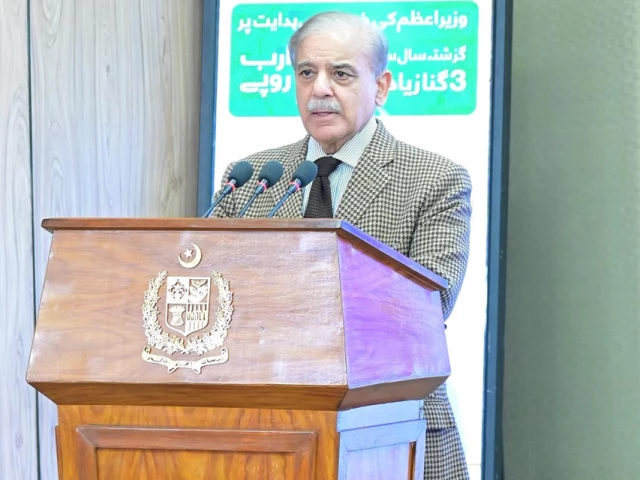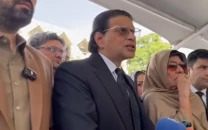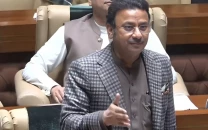PM clears plan to start tariff talks with US
The government plans to reduce tariffs on around 55 products by remaining within the WTO framework

Prime Minister Shehbaz Sharif has endorsed a plan to start negotiations with the United States by offering it lower tariffs and increased market share, as a report says that tariffs hike may dent Pakistan's exports from $564 million to $2.2 billion.
The government plans to reduce tariffs on around 55 products by remaining within the World Trade Organization framework, which would extend the similar benefits to other nations, according to the officials who are privy to these discussions.
These lowered tariffs would be largely in line with the tariffs availed by China under the bilateral Free Trade Agreement (FTA), sources told The Express Tribune. The government has also prepared response to non-tariff concerns raised by the US related ban on X, restrictions on repatriation of profits and other such barriers.
The developments came on the day the enhanced tariffs on 60 countries took effect and some Pakistani exporters received "halt requests" from the US buyers.
Tabadlab, a policy think tank, reported in a brief that the 29% increase in tariffs on Pakistani goods will cause about $564 million loss in exports to US during first year 2025-26. It further said that in an unlikely worst-case scenario, the loss may jump to $2.2 billion.
Prime Minister Shehbaz Sharif on Wednesday chaired a meeting to discuss tariff imposed by the US amid escalation of trade war between the US and China. Beijing on Wednesday further retaliated by imposing additional 34% tariffs on US goods, matching the total 104% duties Washington imposed on the world's second largest economy.
The US also imposed additional 29% tariffs on Pakistani goods to reverse $3 billion trade deficit that it has with Islamabad. Among the US concerns are non-tariff barriers to trade and online restrictions, including on social media platform-X.
The Prime Minister was presented with the report by the Steering Committee and Working Group on the new tariffs imposed by the US and the proposed future course of action. The meeting was presented with various alternative courses of action.
The PM had last week constituted these committees headed by Finance Minister Muhammad Aurangzeb and Commerce Secretary Jawad Paul.
An announcement by the PM's Office said that the government has decided to send a high-level delegation to the US to promote trade relations and hold talks on on US tarrifs imposed by US President Donald Trump's administration.
Shehbaz Sharif has tasked the delegation, which would also include prominent business figures and exporters, to work out a mutually beneficial course of action for the future, read a statement released by the PM's Office.
The sources said that the government's plan included seeking reversal of the additional tariffs in return of facilitating the increase of the market share of the US imports and lowering the tariffs.
The options include cutting tariffs on around 55 product lines with major benefits to be offered on cotton, soyabean and petroleum products.
The tariffs on cotton import are already nil and the government plans to assure the US authorities for additional import of the commodity, according to the sources. In this regards, Prime Minister setup another working group on cotton, which will finalize these proposals.
Some of the contours of the approved plan may need cabinet approvals, including from the Economic Coordination Committee of the cabinet.
Pakistani authorities were of the view that they cannot import goods to make their industries uncompetitive but still want to find a middle group to protect its share of market.
Pakistani plan includes seeking a reversal to pre-April-4th position or at least bringing down the additional tariffs to the levels of its competitors like Egypt and Turkey, said the sources.
"The US-Pakistan trade relations span decades," said PM Shehbaz, adding that the government is keen to further strengthen its trade partnership with the US.
The meeting was informed that the Pakistani Embassy in the US is in constant contact with the US government.
Tabadlab lifts curtain
The policy think tank has issued a preliminary brief report on the implications of the US tariff war on Pakistan's economy.
It says that estimates suggest that Pakistan's export loss will amount to around $564 million in the next fiscal year under the new US tariffspotentially increasing to $2.2 billion over time in the worst-case scenario. This would negatively impact the current account deficit, undermining recent progress and compounding the country's fragile economic growth outlook, it added.
In the unlikely worst-case scenario, Pakistan may lose market share and domestic demand in the US is increasingly met by local producers, it added.
Tabadlab said that its initial discussions with exporters indicate that the sector's low profit margins make it difficult to absorb increased costs and US importers are likely to pass these costs onto US consumers. This could lead to a reduction in the volume of textile imports into the US.
Whether Pakistan will lose or gain market share in the US will largely depend on how the Pakistani government engages with the Trump administration and how other textile-producing countries respond, it added.
Pakistan cannot take advantage
The report says that countries with large home markets, strong trade fundamentals, and significant diplomatic capital may be able to take advantage of the opportunities that the Trump administration's tariff increases present.
"However, Pakistan has historically struggled in such scenarios. Without urgent and strategically coherent policy actions, this moment could become more risk than opportunity for the Pakistani economy", it added.
Pakistan's imports from the US are small in magnitude and generate limited tariff revenueonly $85 million in last fiscal year.
"For American policymakers, tariff tweaks alone won't meaningfully increase exports to Pakistan", said Tabadlab.
Also, the US plays a limited role in Pakistan's primary import categories, accounting for only 1.4% of these, well below the 4% share across all imports, states the report.
Pakistan imports a mix of goods from the US, ranging from low-cost raw cotton and scrap metal to high value pharmaceutical products.
The report says that the US claim of a 58% average tariff rate on its exports to Pakistan appears inconsistent, even when accounting for para-tariffs such as regulatory duties, sales tax, FED, and income tax collected at source, which are not traditional customs duties.
But Tabadlab said that Pakistan uses para tariffs as a tool to generate revenue and "this may represent an area of weakness in negotiations with the US because other countries may not have similar charges applied to imports at the port".
Taken cumulatively, for policy makers, this makes the narrative of fair tariffs a more challenging sell, it added.
Non-tariff barriers
Non-tariff barriers might emerge as a potential point of friction in US-Pakistan trade relations, according to Tabadlab. It said that these include the use of Statutory Regulatory Orders to manage specific import items and restrictions on US digital platforms like X. While the USTR report does not accuse Pakistan of targeted barriers against the US, nor of currency manipulation, it signals areas of concern.
Some significant sectors in which the US currently exports goods but faces significant tariff protection in Pakistan include vehicles having 76% tariffs, furniture 27% tariff, edible fruits and nuts 22% tariff and Paper 19%, according to the brief. Any change on this front would require Pakistan government to change its sector policy, it added.























COMMENTS
Comments are moderated and generally will be posted if they are on-topic and not abusive.
For more information, please see our Comments FAQ